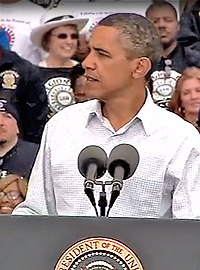| ObamaCare Dividing Unions and White House |
 |
|
By Ashton Ellis
Wednesday, June 12 2013 |
Labor union bosses were some of the fiercest supporters of President Barack Obama’s health care reform law now known as ObamaCare. But due to a rift over implementation, groups representing low-income and part-time workers will not get the special treatment they think is owed them. As a consequence, up to 20 million union members could lose their health benefits, and with them, the main reason for joining a union in the first place. And it’s all thanks to union leadership. Back in 2009, Obama repeated often what will likely be the most unfulfilled promise of his presidency: If you like your doctor and your insurance plan, you’ll be able to keep them under ObamaCare. What he said at the AFL-CIO Convention in Pittsburgh on September 15, 2009, was typical: “Let me repeat: Nothing in this plan will require you to change your coverage or your doctor.” With that promise in mind, Change to Win, a political coalition of labor unions representing low-income and part-time workers, set about promoting the president’s health reform bill. In exchange for helping Democrats push ObamaCare through Congress, the groups affiliated with Change to Win thought they had an understanding with the White House about health reform: It wouldn’t apply to them. In effect, unions like the United Food and Commercial Workers (UFCW) already control their health care market. UFCW, like many unions representing part-time workers, operates a multiple-employee or Taft-Hartley insurance plan. The plans are non-profit ventures administered by both the union and participating employers, and provide coverage for union members during periods of seasonal unemployment. Since multiple-employee plans are run by the union, membership in the union is a requirement to access the plan. In recent decades, the trend in labor-management negotiations has been to prefer benefit increases instead of pay bumps, so unions like UFCW demand inclusion of such plans in their collective bargaining agreements. This gives the union a way to perpetuate its usefulness to members by providing the very benefit they negotiate for. But then ObamaCare was passed, and labor unions found out what was in it. As written, the law does not create any exemptions for multiple-employee plans, meaning that they must absorb all of the new health mandates just like any other insurance provider. These include budget-busting requirements like insuring dependents up to age 26, eliminating pre-existing condition screening and prohibiting age and coverage caps. Faced with increased costs, employers currently partnering with UFCW to provide health coverage are finding no incentives to continue doing so. If anything, ObamaCare makes it financially smart to eliminate health insurance for part-time workers and cut back the hours of full-timers so they become part-time. The reason: The law’s employer mandate to provide insurance or pay a fine only applies to full-time employees. UFCW represents 1.3 million members. Nationwide, the number of part-time union workers using multiple-employee plans is estimated to be 20 million. Thus, thanks to a health reform law that UFCW and other Change to Win unions helped pass, tens of millions of American union members and their families could lose their current doctor and health coverage. If that happens, these workers will become eligible for either federal subsidies to help pay for insurance on a state-based exchange, or an expanded version of Medicaid. Either way, federal taxpayers will foot the bill for an expense that was previously paid for by private sector dollars. Two weeks ago, Joseph T. Hansen, the president of UFCW and current chairman of Change to Win, wrote an op-ed blasting the Obama administration for not fixing his union’s problem. Hansen’s solution would make multiple-employee plans eligible to receive the same federal subsidies available on the exchanges. But regulators are resisting because doing so would open the floodgates of “me-too” lobbying, resulting in an even larger price tag for a law that was once sold as deficit neutral. With fiscal reality rearing its head, it looks like the people who make a living playing hardball with employers went soft on a political crony when they should have demanded concrete assurances. Lacking a special-interest bailout, union leaders will now have to justify their existence to members about to lose a major benefit because the so-called experts got duped. Good luck with that. |
Related Articles : |
























